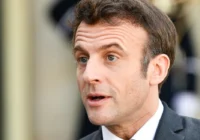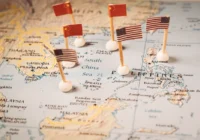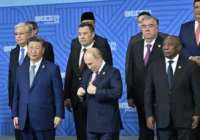One of the key events that took place in June was the G7 meeting in Rome. France’s President Emmanuel Macron, smarting from the disastrous results for his party in the European parliamentary elections, had already dissolved the National Assembly. He presented it as a hope against hope that the electorate would come to its senses and reaffirm its faith in his presidential leadership. He was wrong, as would become clear by July 7, the second round of the snap parliamentary elections. As of today, France has a caretaker government, with no visibility for the future as the nation prepares to welcome the summer Olympics.
On June 19, Edward Quince, playing the literary critic, offered this succinct commentary on the tone of the G7’s pronouncement to the rest of the world:
If you were Mr Xi Jinping, you probably noticed how harsh the most recent G7 communiqué language was in relation to China.
Frankly, if it weren’t for the calendar, I would think it was written by a sovereign of some colonial power trying to reign in its subjects who have gone rogue: We will take this money from you, and we will spend it this way (and listen to us, what we are doing is legal, all in accordance to “our respective legal systems”), and those guys must stop doing this, and those guys must start doing that, we will punish them this way, and we will hit those guys that way… And all of that is of course, “consistent with all applicable laws and our respective legal systems.”
Sitting in Beijing, would you conclude that you need to obey, compromise a little, compromise a lot or get ready for a long confrontation?
Intransigence and indifference to the idea of opening a dialogue with other emerging poles in a visibly changing world order have become the watchwords of the Western alliance.
Changing his focus from the G7’s bombastic expression of the required attitudes, principles and rules it associates with its vaunted “free and open rules-based international order,” Edward followed up on July 5 with a focused look at what is concretely happening with the G7’s unacknowledged rivals: BRICS and the Shanghai Cooperation Organization (SCO). In its current form, and before its next wave of expansion likely to occur during its annual summit in October, BRICS already represents a GDP superior to the G7. And it is only just beginning to define the elements of its system, and notably its financial tools.
The BRICS have allegedly already advanced to practical implementation of an alternative non-dollar financial system based on gold derivatives, smart contracts, permissionless and trustless blockchains.
A few notes from my conversations with people who attended the recent summit of the Shanghai Cooperation Organization:
Three key topics were discussed:
· Non-dollar finance
· Military cooperation
· New trade rules
Premier Modi was strategically absent.
Note: It is important to understand that the SCO is seen as a security organization, not quite like NATO yet, but its activities primarily focus on security. Initially centered on establishing border security between China and the republics of the former USSR, its scope has expanded to include trade security, economic security, cyber security, etc. The BRICS is primarily focused on trade, and the SCO on security; there’s some overlap between the two.
Regarding the first topic, ie non-dollar finance, several key projects were addressed. Work involved allocating funds, personnel, and other resources to:
- BRICS Bridge: Consensus was reached to proceed with using the ‘BRICS Bridge’ to replace the USD in all military and arms trade among member states.
The BRICS Bridge purportedly utilizes gold-based digital tokens and other derivatives as a medium for transactions involving any combination of currencies, including digital currencies, with a focus on CBDCs. Notably, pilot transactions have already begun for trading energy, commodities and arms, mostly at the level of single-digit millions.
This system employs highly secure, permissionless, and trustless blockchain technology, likely based on Ethereum (ETH), including smart contracts and various types of mixers to obfuscate transacting entities’ identities for a fee. It’s confusing, but one interesting feature of BRICS bridge is the ability to transact via SWIFT as well. The infrastructure is reportedly developed in Solidity, with engineering conducted concurrently by multiple “very agile” teams across different countries under the coordination of a “prominent software and hardware corporation.”
- New Non-dollar Finance Mechanics: A significant discussion revolved around establishing a new risk-free standard to replace T-bills as a risk-free asset. This problem is seen by many as the most difficult to solve. In June, during the recent BRICS foreign ministers’ meeting, several technical proposals on the topic were presented to the finance working group.
There was some informational “echo” that one could observe; most notably (I’m quoting from the sources linked):
- July 4, President of Belarus, whose country has just become a full member of the SOC, suggested stepping up practical interaction across the entire complex agenda of the Shanghai Cooperation Organization. He suggested starting with finance.
“As a priority matter Belarus sees the creation of a mechanism for bilateral payments using national currencies and the creation of a collective financial institution of the Shanghai Cooperation Organization,” he stated. The president noted that Shanghai Cooperation Organization countries account for a considerable share of the world’s population and the world’s GDP. “Only our organization includes two most powerful leaders – China and the Russian Federation. And we keep trembling around U.S. dollars. Well, let’s finally take certain steps in order to reduce dependence on the dollar. And you will see how those who wave around the dollar club understand that things can no longer continue like that. We see all of it, but we don’t take action. While people are waiting,” the Belarusian leader noted.
- July 3, One of Russia’s key bankers, Andrey Kostin, suggested that all cross-border transaction work be conducted in strict confidentiality: “I see very clearly how each of our appearances, especially with such coverage, prompts someone in the US Embassy, perhaps the Second Secretary, to sit and record everything. We’ve observed that regardless of the steps we take, their reaction is very swift,” noted Mr. Kostin, speaking at the Financial Congress of the Bank of Russia, streamed on the bank’s YouTube channel. “Whenever VTB representatives discuss international settlements, a delegation promptly arrives and begins pressuring local authorities about what they shouldn’t do. How many times have I been asked, ‘What’s happening in China?’ Our response has always been, ‘Everything is fine for us in China.’ Then, on June 12, we faced new special sanctions against our bank in Shanghai,” added the head of VTB.
Note that only one of the two contending presidential candidates in the US appears to have noticed what’s going on. Former President Donald Trump had this to say on an All In podcast:
“We are losing a lot of countries on the dollar. I mean they’re going like flies. If we ever lose that, that’s the equivalent of losing a war. That would really make us third world. We have lost so many countries. I looked the other day. So, Russia is gone. You take a look: Ukraine doesn’t sort of exist in a sense. Nobody knows what’s going on there, but when you look at China, it’s essentially gone. They’re trying to get out of it, they’re our primary competitor. Iran is not there. The other day, I read where Saudi Arabia is willing to now go in various different currencies instead of the dollar. This is a tragedy. This is a big thing that is happening against our country and we cannot let that happen.”
It may be fitting that Edward ends with this quotation from Trump, who, thanks in part to a failed assassination attempt, appears to have consolidated his position against a waning incumbent President Joe Biden in the upcoming election. Biden’s silence on this question is deafening. Does he have nothing to say? He certainly cares.
Edward’s contributions leave us with the impression that, in contrast with the dynamic focus of everyone involved in BRICS, the Western bloc, especially in its incarnation as the G7, exists less an institution seeking to shape a changing world than as the remnant of a self-admiring fan club dedicated to two things:
- celebrating, for lack of a founding constitution, the historical idea of a rules-based international order,
- the pursuit of the war in Ukraine viewed as a holy Crusade that permits it to maintain its faith.
The G7 believes it has given the world its shape, and — like the God of Genesis during the seven days of creation — looked at its work and “saw that it was good.” BRICS, in contrast, is busy putting numerous elements in place with a view to designing a new shape to the world. Edward imagines President Xi’s reaction, but it is the entire world that now finds itself wondering whether the choice is “to obey, compromise a little, compromise a lot, or get ready for a long confrontation.” The rhetoric of the G7’s communiqué indicates that the West sees that confrontation as already taking place in Ukraine, mentioned 52 times in that document. BRICS, in contrast, was not mentioned once.
Join the debate
Money Matters…, is dedicated to developing this discussion and involving all interested parties.
We invite all of you who have something to contribute to send us your reflections at dialogue@fairobserver.com. We will integrate your insights into the ongoing debate. We will publish them as articles or as part of the ongoing dialogue.
*[Fair Observer’s “Crucible of Collaboration” is meant to be a space in which multiple voices can be heard, comparing and contrasting their opinions and insights in the interest of deepening and broadening our understanding of complex topics.]
[Lee Thompson-Kolar edited this piece.]
The views expressed in this article are the author’s own and do not necessarily reflect Fair Observer’s editorial policy.
Support Fair Observer
We rely on your support for our independence, diversity and quality.
For more than 10 years, Fair Observer has been free, fair and independent. No billionaire owns us, no advertisers control us. We are a reader-supported nonprofit. Unlike many other publications, we keep our content free for readers regardless of where they live or whether they can afford to pay. We have no paywalls and no ads.
In the post-truth era of fake news, echo chambers and filter bubbles, we publish a plurality of perspectives from around the world. Anyone can publish with us, but everyone goes through a rigorous editorial process. So, you get fact-checked, well-reasoned content instead of noise.
We publish 2,500+ voices from 90+ countries. We also conduct education and training programs
on subjects ranging from digital media and journalism to writing and critical thinking. This
doesn’t come cheap. Servers, editors, trainers and web developers cost
money.
Please consider supporting us on a regular basis as a recurring donor or a
sustaining member.
Will you support FO’s journalism?
We rely on your support for our independence, diversity and quality.










Comment